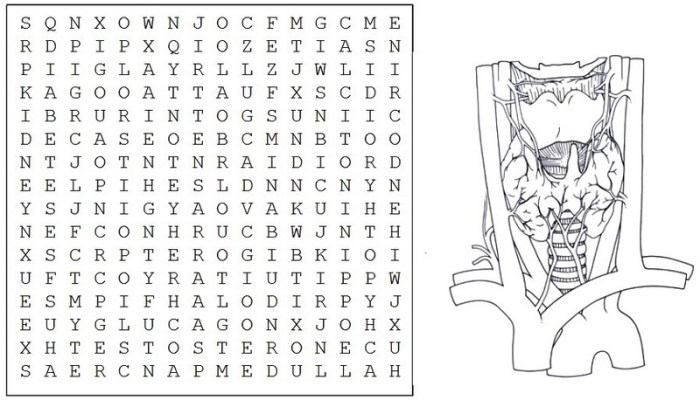Embark on a journey of discovery with our comprehensive Endocrine System Word Search Answer Key. This guide unlocks the intricacies of the endocrine system, revealing the vital role of hormones in regulating our bodies’ functions. Prepare to delve into the depths of hormone production, regulation, and the impact of endocrine disorders on overall health.
Unveiling the major endocrine glands, we’ll explore the diverse hormones they secrete and their essential functions. Discover how these hormones interact with target cells, orchestrating a symphony of physiological processes. Delve into the complexities of endocrine system disorders, unraveling their causes, symptoms, and treatments.
Witness the remarkable feedback mechanisms that ensure hormonal balance, and uncover the profound influence of the nervous system on endocrine regulation.
Endocrine System Overview: Endocrine System Word Search Answer Key

The endocrine system is a network of glands that produce and secrete hormones, which are chemical messengers that regulate various bodily functions. Hormones act on specific target cells or organs, influencing their growth, development, and activity.
Unlike enzymes, which catalyze biochemical reactions within cells, hormones work by binding to receptors on the surface of target cells, triggering a cascade of intracellular events.
The hypothalamus and pituitary gland play a crucial role in hormone regulation. The hypothalamus, a small region of the brain, produces releasing and inhibiting hormones that control the release of hormones from the pituitary gland. The pituitary gland, located at the base of the brain, secretes hormones that regulate growth, metabolism, and reproduction.
Major Endocrine Glands
The major endocrine glands include:
- Pineal gland:Secretes melatonin, which regulates sleep-wake cycles.
- Thyroid gland:Secretes thyroid hormones, which regulate metabolism and growth.
- Parathyroid glands:Secrete parathyroid hormone, which regulates calcium and phosphate levels.
- Adrenal glands:Secrete adrenaline and cortisol, which respond to stress and regulate blood pressure and glucose levels.
- Pancreas:Secretes insulin and glucagon, which regulate blood glucose levels.
- Ovaries (in females):Secrete estrogen and progesterone, which regulate reproductive function and secondary sexual characteristics.
- Testes (in males):Secrete testosterone, which regulates reproductive function and secondary sexual characteristics.
These hormones interact with target cells, influencing their function and maintaining homeostasis.
Endocrine System Disorders
Endocrine disorders occur when the endocrine system malfunctions, resulting in abnormal hormone production.
- Diabetes:A disorder of insulin secretion or action, leading to elevated blood glucose levels.
- Thyroid disorders:Conditions affecting the thyroid gland, such as hyperthyroidism (overactive thyroid) or hypothyroidism (underactive thyroid), which disrupt metabolism and other bodily functions.
- Cushing’s syndrome:A disorder caused by excessive cortisol secretion, resulting in weight gain, high blood pressure, and impaired immune function.
These disorders can have significant health consequences and require appropriate treatment to manage hormone levels and alleviate symptoms.
Regulation of the Endocrine System
Hormone production is regulated by feedback mechanisms to maintain hormonal balance.
- Negative feedback:When hormone levels rise, the body responds by inhibiting hormone production to bring levels back to normal.
- Positive feedback:In certain cases, rising hormone levels stimulate further hormone production, amplifying the response.
The nervous system also plays a role in endocrine regulation through the hypothalamus, which receives signals from the brain and sends signals to the pituitary gland.
Applications of Endocrinology, Endocrine system word search answer key
Endocrinology has numerous applications in medicine and healthcare:
- Hormone replacement therapy:Used to treat hormone deficiencies, such as insulin therapy for diabetes or thyroid hormone replacement for hypothyroidism.
- Reproductive health:Endocrinologists manage hormonal imbalances affecting fertility and pregnancy.
- Cancer treatment:Some cancers are influenced by hormones, and endocrinologists may use hormone therapy to control tumor growth or alleviate symptoms.
Answers to Common Questions
What is the function of the endocrine system?
The endocrine system regulates various bodily functions, including metabolism, growth, reproduction, and mood, through the production and secretion of hormones.
How do hormones differ from enzymes?
Hormones are chemical messengers that travel through the bloodstream to target specific cells, while enzymes are proteins that catalyze specific chemical reactions within cells.
What is the role of the hypothalamus and pituitary gland in hormone regulation?
The hypothalamus acts as the control center, releasing hormones that stimulate or inhibit the pituitary gland, which in turn regulates the secretion of hormones from other endocrine glands.